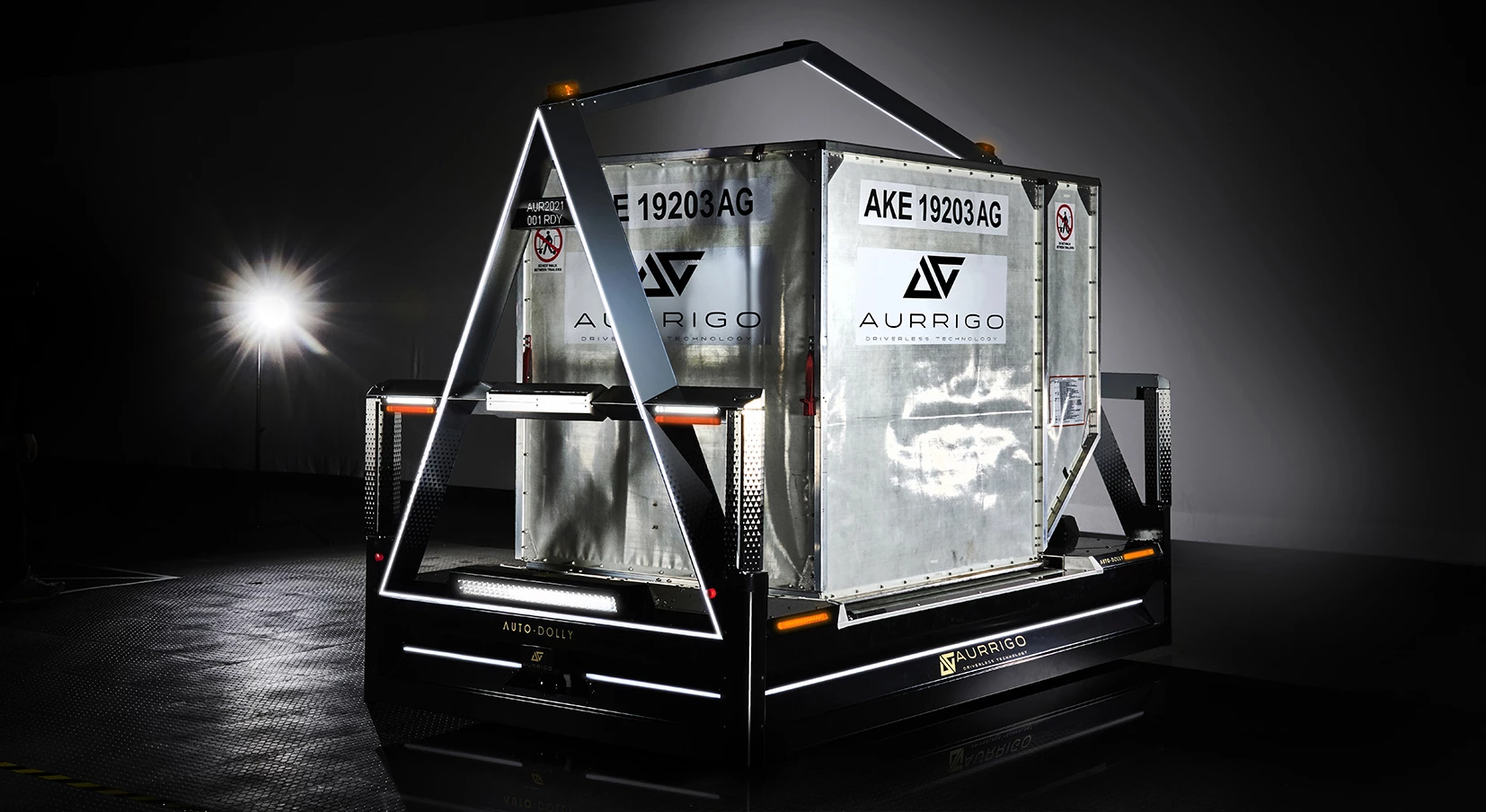
Member Article
Auto-Dolly heads to arrivals with new autonomous luggage and cargo system for the aviation sector
A new autonomous luggage and cargo system has been launched that promises to offer a host of operational, sustainability and financial savings to an aviation sector that has been besieged by Covid-19.
Aurrigo, one of the world’s leading autonomous vehicle specialists, has officially unveiled the Auto-Dolly, which will give airports the opportunity to move pallets and ULD containers around indoor and outdoor settings without the need for human operators.
The vehicles have the ability to navigate their way autonomously from one task to another, collecting and dropping off the cargo automatically using a powered roller deck and the unique ability to ‘crab’ sideways when docking and parallel parking.
All weather running is achieved by weather-hardened sensors and innovative software processes that allow the Auto-Dollies to operate in snow, heavy rain, direct sunlight and fog.
A recent trial at Heathrow and a digital-twinning project with a leading Asian airport have revealed that this technology can reduce the number of traditional tractors and trailers used to transport cargo and luggage by two thirds, as well as cutting carbon emissions by 60%.
Aurrigo is engineering and producing these vehicles at its UK-based Advanced Engineering Centre and is now looking to finalise deals with airline operators and airports across the world.
“The aviation sector is going through one of the worst periods in living memory. When it emerges, it will need to explore ways where it can achieve cost savings and increase operational efficiencies, including turning around planes and getting them away on time,” explained David Keene, Chief Executive of Aurrigo.
“Auto-Dolly has the potential to revolutionise airports by improving efficiency in the way aircraft baggage and cargo is loaded, unloaded and sorted. The autonomous system also reduces human contact, extremely important in today’s socially distanced world and saves space in the terminal buildings, as every Auto-Dolly carries a load, unlike the tractor and trailer systems that are in use today, where the tractor can’t carry a pallet.”
He continued: “Our autonomous vehicles are controlled by our Fleet Management system, which intelligently assigns them in the optimum way to meet the strict deadlines of logistics dispatch and airport cargo handling. The operational view of the fleet is provided by a cloud-based dashboard to allow managers to monitor the cargo movements, energy usage and progress of each task, giving them real-time info to make the right decisions.
“Engagement with lead customers, together with on-site airport trials, have been fantastic and we’re now in the position to launch our dolly solution to the world. We’re already working through 20 live global enquiries, including the possibility of operating them at Eindhoven Airport.”
Aurrigo has designed and engineered the Auto-Dolly from the ground-up, using bespoke front and rear axles and a lightweight structure to maximise the load carrying capacity and minimise the operational carbon footprint.
A team of 20 engineers and software specialists have been working on the technology since 2017, with the first prototype of the autonomous vehicle demonstrated at Heathrow airport in 2019.
This deployment was crucial in helping the company capture the myriad of operational requirements expected of this system when used alongside existing processes.
“We have also engineered an Auto-Dolly Fleet Simulator System, which completes the final piece of the puzzle as it models today’s logistics processes and vehicle movements as a ‘digital-twin’ to optimise how operations are currently performed,” added Simon Brewerton, Chief Technical Officer at Aurrigo.
“The modelling, which has been used to simulate a world leading airport in Asia, has been expanded to show how fleets of Auto-Dolly vehicles can mix with human operated systems in a measured and cooperative way. The simulation demonstrates the cost savings that can be realised by transitioning from today’s processes to an automated logistics solution over the period of several years.”
He concluded: “This could equate to hundreds of millions of pounds of cost reduction every year, plus the huge environmental savings gained by reducing overall emissions of the fleet of inefficient tractors and trailers by 60%.”
Aurrigo is a UK leader in the development of autonomous vehicles, providing driverless pods and shuttles for UK Autodrive, the Wales Open and exciting new transport projects in Cambridge and Milton Keynes.
For further information, please visit www.aurrigo.com or follow @aurrigotech on twitter
This was posted in Bdaily's Members' News section by Russ Cockburn .




 test article 123456789
test article 123456789
 hmcmh89cg45mh98-cg45hm89-
hmcmh89cg45mh98-cg45hm89-
 test456456456456456456
test456456456456456456
 test123123123123123123
test123123123123123123
 test xxxdiosphfjpodskhfiuodsh
test xxxdiosphfjpodskhfiuodsh
 Savour the flavour: North Tyneside Restaurant Week returns for 2024
Savour the flavour: North Tyneside Restaurant Week returns for 2024
 Six steps to finding the right buyer for your business
Six steps to finding the right buyer for your business
 Stephen signs off on a special night
Stephen signs off on a special night
 Life’s a Peachaus: Gillian Ridley Whittle
Life’s a Peachaus: Gillian Ridley Whittle
 Making a splash: Phil Groom
Making a splash: Phil Groom
 Making workplace wellbeing a priority
Making workplace wellbeing a priority
 A record of delivery, a promise of more: Ben Houchen
A record of delivery, a promise of more: Ben Houchen